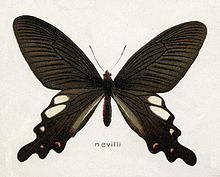Byasa nevilli, the Nevill's windmill, is a butterfly found in India that belongs to the windmills genus (Byasa), comprising tailed black swallowtail butterflies with white spots and red submarginal crescents.
| Nevill's windmill | |
|---|---|

| |
| Scientific classification | |
| Domain: | Eukaryota |
| Kingdom: | Animalia |
| Phylum: | Arthropoda |
| Class: | Insecta |
| Order: | Lepidoptera |
| Family: | Papilionidae |
| Genus: | Byasa |
| Species: | B. nevilli
|
| Binomial name | |
| Byasa nevilli Wood-Mason, 1882[1]
| |
| Synonyms | |
|
Atrophaneura nevilli | |
Range
editNorth east India (Assam), Myanmar (Shan states) and western China.
Status
editIt is very common in western China and very rare in India. This butterfly is protected in India though it is not known to be threatened.
Taxonomy
editNo separate subspecies have been described.
Description
editThe wingspan is 100–120 mm. In appearance it is similar to the great windmill (Byasa dasarada), but is smaller. The tail is not red-tipped. It also resembles the great windmill subspecies B. d. ravana, Moore, but is smaller, with the markings also proportionately smaller. The male differs as follows: the subterminal series of lunules on the hindwing are crimson or vermilion red, never white or partly white as in B. d. ravana; sexual abdominal fold within white, not blackish brown; the subterminal red lunule in interspace 3 very often missing. Female resembles the male rather than the female of B. d. ravana but the white rectangular markings in interspaces 5 and 6 are whiter. From B. d. ravana female it differs in the complete absence of the white discal spots in interspaces 1, 2, 3 and 4. In both sexes the tail is black without any red spot.[2]
See also
editNotes
edit- ^ Häuser, Christoph L.; de Jong, Rienk; Lamas, Gerardo; Robbins, Robert K.; Smith, Campbell; Vane-Wright, Richard I. (28 July 2005). "Papilionidae – revised GloBIS/GART species checklist (2nd draft)". Entomological Data Information System. Staatliches Museum für Naturkunde Stuttgart, Germany. Archived from the original on 9 September 2010. Retrieved 21 June 2013.
- ^ Bingham, C.T. (1907). The Fauna of British India, Including Ceylon and Burma. Vol. II (1st ed.). London: Taylor and Francis, Ltd.
References
edit- Collins, N. Mark; Morris, Michael G. (1985). Threatened Swallowtail Butterflies of the World: The IUCN Red Data Book. Gland & Cambridge: IUCN. ISBN 978-2-88032-603-6 – via Biodiversity Heritage Library.
- Evans, W.H. (1932). The Identification of Indian Butterflies (2nd ed.). Mumbai, India: Bombay Natural History Society.
- Haribal, Meena (1992). The Butterflies of Sikkim Himalaya and Their Natural History. Gangtok, Sikkim, India: Sikkim Nature Conservation Foundation.
- Wynter-Blyth, Mark Alexander (1957). Butterflies of the Indian Region. Bombay, India: Bombay Natural History Society. ISBN 978-8170192329.
External links
edit- Global Butterfly Information System - Text, images including holotype of chentsong Oberthür, 1886 and type information on stenoptera Chou & Gu, 1994